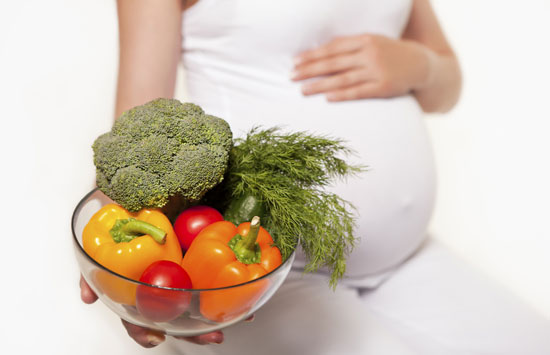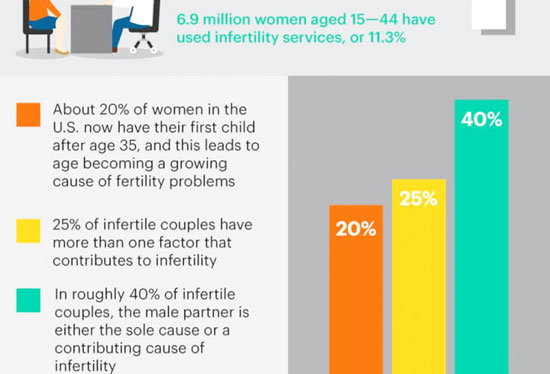Natural infertility treatment and home remedies

If you’re a woman, you either already have or almost undoubtedly will hear the tick of your biological clock at some point in your life calling you to become a mother. What if that tick goes unanswered? According to the Centers for Disease Control and Prevention (CDC), millions of women in America suffer from infertility, with some 7.5 million between the ages of 15 and 44 having difficulty getting pregnant or staying pregnant. That’s a lot of women wanting to become pregnant who are sadly unable to do so. Thankfully, there are natural infertility treatment options that may help.
The rate of infertility continues to increase in America and around the world. Many blame the toxins in our modern world polluting the body and compromising precious functions, such as fertility, pregnancy and child birth.
What is infertility? Primary, infertility is defined as not being able to get pregnant despite having frequent, unprotected amorous intimate relationships for at least a year. Secondary, infertility is defined as the inability to become pregnant or to carry a pregnancy to term following the birth of one or more biological children. There can be many causes of infertility, including poor nutrition, emotional stress, sexually transmitted diseases, thyroid disorders, candida, medical conditions, eating disorders, excessive exercise, obesity, and hormonal problems.
The good news is that most couples will eventually conceive if they choose to do so, with or without treatment. Here are the best natural infertility treatment options that can help loving couples who want a child conceive sooner rather than later without timely, costly and often invasive infertility treatments.
Natural Infertility Treatment
1. Eat a Healing Diet
One of the most important natural infertility treatment options, as with most conditions, is to eat a proper, healthy diet. Foods that help natural infertility treatment include:
Organic Foods – Pesticides can affect estrogen and other hormones, therefore it’s important to choose only organic products as much as possible.
Vitamin E-Rich Foods – Vitamin E is critical for many hormones and proper functioning of the endocrine system.
Foods Rich in Vitamin C – Vitamin C helps trigger ovulation in women and can increase sperm in men. Vitamin C foods also help your body absorb iron, an important nutrient for women who become pregnant. Grapefruits and other citrus fruits, kiwis, guava, red peppers, and kale are great sources.
Foods Rich in Folate – Folate or folic acid is a B vitamin that helps the body build new cells and prevents birth defects. Experts recommend increasing folate intake before getting pregnant to ensure a healthy pregnancy. Most women are encouraged to take a prenatal vitamin with folic acid to ensure that they get the recommended 400 to 800 micrograms daily. Foods naturally rich in folate include green leafy vegetables, citrus fruits, beans and wheat germ.
Broccoli, Cabbage and Brussels Sprouts – These cruciferous vegetables contain indole-3-carbinol, which helps the liver metabolize estrogen. It’s best to steam cruciferous vegetables, avoiding the goitrogens present in their raw state.
Pumpkin Seeds – For men, these seeds provide zinc, an essential nutrient for reproduction.
Foods that can actually negatively impact fertility include:
High-Fat Processed Meats – These can increase inflammation levels and may contain additives.
Grains – Grains may increase cortisol and estrogen, leading to infertility issues.
Refined Sugar – Refined sugar reduces immune function and may cause nutrient depletion. High intake of refined sugar also contributes to obesity, which is a big risk factor for infertility.
Alcohol – Alcohol increases inflammation and reduces immune function. For women, heavy drinking is associated with an increased risk of ovulation disorders and endometriosis. For men, it lowers testosterone levels, causes erectile dysfunction and decreases sperm production.
Caffeine – Caffeine can cause hormonal imbalances, dehydration and lead to mineral deficiencies. High consumption has been shown to interfere with fertility. Lowering your caffeine or giving it up entirely is a smart idea when you’re trying to get pregnant, especially if you’re having trouble. The American Pregnancy Association says that more than 200 to 300 milligrams of caffeine per day may reduce fertility by 27 percent, so you want to avoid caffeine overdose.
Drugs – Drugs can negatively affect fertility by making ovulation more difficult each month.
2. Take Fertility-Promoting Supplements
Another natural infertility treatment is to consume more fertility-promoting supplements, including:
Evening Primrose Oil (1,500 mg 1-2 times daily from day 1 to 14 of menstrual cycle). Evening primrose contains high levels of gamma-linolenic acid (GLA), an essential fatty acid that may boost fertility efforts by increasing cervical mucus and strengthening uterine function. Take 1,500 milligrams one to two times daily from day one through 14 of the menstrual cycle.
Vitex (Chasteberry) – It helps balance estrogen and progesterone ratios and stimulates the ovaries. Take 160—240 milligrams daily.
Vitamin C – Vitamin C can help prevent sperm agglutination in men. Take 500 milligrams twice daily.
B-Complex – B vitamins are involved in estrogen metabolism. Take 50 milligrams daily.
Vitamin E – Vitamin E is an important vitamin for fertility to help with hormonal balance. Consume 400 international units daily.
Progesterone Cream – This can be applied topically to help naturally balance out estrogen and progesterone levels. Take a quarter teaspoon during days six through 26 of the menstrual cycle and stop after the third month of pregnancy.

3. Decrease Stress
You’ll often find decreasing stress as a solution to infertility at the bottom of the list, but it’s an important natural infertility treatment. In today’s world, we live with high stress and continually underestimate its impact on our health. It is crucial to decrease stress for overall good health and in particular if you’re trying to conceive.
Research has shown that stress has a direct impact on a woman’s risk for infertility. One study measured the levels of an enzyme linked with stress in the saliva of women who were trying to get pregnant over a one-year time span. The enzyme is alpha-amylase, an enzyme that helps the body digest carbohydrates that’s also linked to the fight-or-flight stress response.
The researchers found that out of about 400 couples who completed the study, 87 percent of the women were able to get pregnant. After making adjustments for age, race, income, and alcohol, caffeine and cigarette use, the researchers found that the women with the highest amylase levels had a 29 percent lower likelihood of pregnancy compared to the women who had the lowest levels of the enzyme.
This is the perfect time to take a look at your priorities, determine what causes you the most stress and eliminate it from your life if at all possible. If you cannot eliminate it, you must find healthy ways to cope with the stress and lower it. Once you become a parent, all priorities shift. If you’re stressed out, your cortisol levels are elevated, which leads to not only infertility, but all sorts of other physical and mental problems. Now is the time to take stress and its impact on your body seriously, and natural stress relievers make for great natural infertility treatment options.
4. Get More Sleep
In addition to keeping stress levels low, getting adequate sleep is vitally important at improving fertility. The average woman (30 to 60 years old) gets only six hours and 41 minutes of sleep per night during the work week, according to the National Sleep Foundation. Research has shown that not clocking enough hours of sleep each night can negatively impact your ability to conceive.
Why is sleep so important to getting pregnant? There are actually multiple reasons. Sleeping (or not sleeping) has a powerful effect on your body’s hormonal system. If you don’t get enough sleep, then your cycle as well as ovulation can get thrown off. If you don’t get enough shut-eye, your leptin (appetite hormone) levels typically go down, and this can negatively impact ovulation as well. People who have serious sleep problems, like insomniacs, also tend to have higher levels of stress hormones, which is not encouraging of fertility.
You should aim for eight-nine hours of sleep per night and schedule down time during the week to do things that bring you joy. If you’re having trouble sleeping, natural sleep aids can help work as a form of natural infertility treatment as well.
5. Exercise to Balance Hormones
Some people can immediately feel the difference in their hormones (even though they may not know this is what it is) when they engage in exercise. The mood improves, they sleep better and they may even experience an increase in their amorous appetite. All of these changes occur with changes in hormones. For example, we often hear about the “feel good hormone” serotonin increasing with exercise.
Our bodies are created to eat healthy and be active each and every day, but so many of us don’t even come close to this normal existence. If you want to become pregnant, it’s vital, yet often overlooked, to engage in regular exercise in order to get your hormones in proper order – or in other words balanced. From the release of the egg to the condition of the sperm and its ability to reach and fertilize the egg, hormones play a role in just about every process when it comes to conception.
Engaging in burst training and weight training is the best way to exercise to effectively balance your hormones. Exercising regularly also promotes a healthy waistline, which will help your chances of conceiving. However, take caution against long-distance cardio exercising or anything overly strenuous, as studies have shown that working out too hard can cause problems with hormones and fertility. Researchers have found that physical activity at both very high or very low levels negatively affects fertility, while moderate activity is beneficial.
6. Chiropractic Care for Fertility
Going to the chiropractor may not be the first thing you consider when you want to become pregnant, but research shows it just may hold important keys to the current infertility problem across the US nation. Chiropractic care is based on wellness of the entire body, not simply treating one symptom with a drug or surgery as we so often do today. When it comes to fertility, chiropractic adjustments can really make a difference for many people.
According to the International Chiropractic Pediatric Association, research shows that any misalignment in the spinal column can impact nerve impulses. When it comes to infertility, blocked neurological signals can seriously impact the pituitary as well as hypothalamus, creating problems with hormone balances that often lead to infertility problems. It’s vital to have a healthy spine in order to have a healthy reproductive system.
7. Essential Oils
For some, essential oils for hormones can be a helpful part of natural infertility treatment. For women, roman chamomile, thyme and ylang-ylang may promote fertility, and for men sandalwood and again thyme can help.
Infertility Risk Factors, Root Causes and Symptoms
Many times if a couple tries to conceive and is unable to, the man and woman think there must be something wrong with them, something pretty serious. They’ll often think that one is or both of them are just completely infertile. However, that simply isn’t always – or even most often – the case.
There are risk factors for infertility, many of which are under your control. One you can’t control is your age, and unfortunately, the older a women gets, the harder it can be to conceive due to a decrease in the quality and quantity of eggs. The other risk factors are all under your control: poor diet, stress, smoking, being overweight, thyroid disorders, heavy alcohol consumption and contracting a sexually transmitted disease. For women, insufficient exercise (contributes to obesity) or, less often, frequent, strenuous, intense exercise (associated with ovulation issues) can be risk factors as well. Exposure to environmental toxins, including pesticides and lead, is also a risk factor for both male and female fertility.

Irregular or abnormal ovulation in a woman is responsible for about 25 percent of all female infertility problems. In roughly 40 percent of infertile couples, the male is either the sole cause or a contributing cause of the couple’s infertility. A man may not be producing enough sperm, or the sperm make may be too slow or oddly shaped. Thus, it can be a problem of quantity or quality, or both.
There are several possible biological causes of infertility for a woman, including lack of ovulation, premature ovarian insufficiency, polycystic ovary syndrome, hypothalamic dysfunction, too much prolactin, damaged fallopian tubes and endometriosis. However, sometimes a cause of infertility just is not found, but it corrects itself over time, which is even more likely if you try natural infertility treatment at home.
When is a woman least fertile? It’s good to know so you can time intercourse appropriately. Women are typically at their least fertile right before menstruation, during menstruation and just after menstruation. However, it’s possible to get pregnant at any time of the month.
Signs of infertility include:
– Inability of a couple to conceive;
– A menstrual cycle that’s too long (35 days or more) or too short (less than 21 days), unless the woman has successfully suspended her menstruation;
– Irregular periods or an absent menstrual cycle can be a sign of lack of ovulation, which can be associated with female infertility;
– In rare cases, an infertile man may have some signs of hormonal problems, such as changes in hair growth or sexual function.
There are often no other outward signs or symptoms of female infertility. If medical problems have been ruled out or if you simply haven’t gotten that far yet, there are a number of options when it comes natural infertility treatment. These approaches are simple, inexpensive and are great ways to promote your overall health too. Try a few or even all of the natural infertility treatment options mentioned above before you panic or even give it another moment’s worry.
Infertility by the Numbers
– 10 percent to 15 percent of couples in the U.S. are infertile.
– Number of women aged 18 – 44 with impaired fecundity (impaired ability to get pregnant or carry a baby to term) is about 7.5 million or 12.3 percent.
– Number of married women aged 18 – 44 who are infertile (unable to get pregnant after at least 12 consecutive months of unprotected sex with husband) is 1.0 million or 6.1 percent.
– Number of women aged 18 – 44 who have ever used infertility services is 6.9 million (11.3 percent).
– About 20 percent of women in the U.S. now have their first child after age 35, and this leads to age becoming a growing cause of fertility problems.
– About a third of couples in which the woman is older than 35 years have fertility problems.
– 25 percent of infertile couples have more than one factor that contributes to their infertility.
– Irregular or abnormal ovulation accounts for approximately 25 percent of all female infertility problems.
– In roughly 40 percent of infertile couples, the male partner is either the sole cause or a contributing cause of infertility.
– Up to 13 percent of female infertility is caused by cigarette smoking.
– Chlamydia causes about 4 million to 5 million infections annually in the U.S. If left untreated, chlamydia can cause infertility.
Final Thoughts on Natural Infertility Treatment
Struggling with infertility can be a highly upsetting and personal experience. As the rates of infertility continue to climb, we must look for all-natural solutions when this natural process of fertility goes awry. The costs of traditional drug and surgery treatments for infertility are not only high financially, but they can take a physical toll down the road for both the parents and conceived child.
As with many of the other physical and emotional health problems, it’s best to get back to the basics with diet, exercise, low stress levels and making an effort to minimize your exposure to toxins to start. When your overall health (both physical and mental) is optimal, the rest will surely follow. Don’t underestimate the power of natural infertility treatment, and try these treatments today.
yogaesoteric
November 15, 2017
